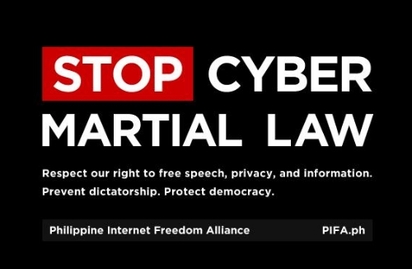
Philippine Internet Freedom Fighters are gaining support from international human rights groups.
Those Philippine congressmen and senators who claim to be freedom lovers and human rights supporters can now eat their words. The world now knows what they truly are -- FASCISTS.
Here's a report from FROM ABS CBN NEWS:
US human rights groups blast Philippine cybercrime law
By Jojo Malig, ABS-CBNnews.com
Posted at 10/05/2012 12:42 AM | Updated as of 10/05/2012 9:41 AM
MANILA, Philippines - US-based international human rights groups on Thursday
criticized the Philippine government for passing the Cybercrime Prevention Act
of 2012, which is seen to curtail Internet freedom.
The Washington, DC-based Freedom House condemned the passage of Republic Act No. 10175, which was signed into law by President Benigno Aquino on September 12.
The independent rights watchdog organization urged the Filipino lawmakers to heed the calls of netizens and repeal several provisions in the law that went into effect October 3.
"While the Cybercrime Prevention Act addresses issues relating to online crime, the provisions of the law that extend to libel and 'other offenses' violate established global norms of free expression," Freedom House said in a press statement. "The Philippines’ existing libel law is vague, criminalizing any speech deemed 'critical,' including speech criticizing the government or other authorities."
It added that the new law authored by Senator Edgardo Angara extended the Revised Penal Code to cover online speech and slapped a maximum penalty of 12 years, which is double the maximum penalty for libel in traditional media.
"[The law also] leaves open the possibility of authors facing ‘double punishment’ for libel if their work appears both online and in print," the group said.
Freedom House also expressed concern that because of the law's vague wording, anyone who shares offending content could end up behind bars.
"Merely a Facebook "Like" could be construed as libel under the Cybercrime Prevention Act. The law also establishes that the Department of Justice can block websites that contain criminal content without in-depth or third party review, and that it can monitor online communications traffic without a court-ordered warrant," it added.
"Freedom House recognizes the need to prevent online crimes but believes that this act is a gross overreach that severely jeopardizes the Philippines’ status as a country with a free Internet. This law could lead to widespread self-censorship by individuals and online platforms and cause a chill in what has been a vibrant space for free expression," it said.
'Dark day for the Philippines'
The San Francisco-based Electronic Frontier Foundation (EFF), described the passage of RA 10175 as a
"dark day for the Philippines."
Jillian York, EFF director for International Freedom of Expression, said the new law is troubling because its libel provision that criminalizes anonymous online criticism as well as its takedown clause that also allow the Department
of Justice to block access to websites without a court order.
"EFF stands with the many local activists in opposing this egregious violation of freedom of expression and offers our support to the petitioners and other activists in standing against the Cybercrime Prevention Act," York said.
She encouraged support for Philippine groups and initiatives opposing the new law.
International campaign
The New York-based Access, meanwhile, has launched an international campaign to call on the Philippine
government to repeal the Cybercrime Prevention Act.
"The Cybercrime Prevention Act, which just came into effect, is so broad and loophole-ridden that a wide range of online activity could be considered libelous. Even if you don't write the material, just sharing it with someone online could land you in prison," the Access petition said, referring to the "libel by republication" and "aiding and abetting" doctrines in criminal
law.
"In the face of this unjust law, Filipinos have been protesting in the streets and online to stand up for their rights. With elections just around the corner, we've been told that many politicians are downright scared of a national and international backlash, giving us the opportunity to convince them to junk this law for good. And we know there's nothing like an election to get politicians to listen," the group said.
Access said that while the Philippine Supreme Court is scheduled to take up the constitutionality of the law on Tuesday, and simultanously, silent and non-violent protests will also be held on October 9 or "Black Tuesday."
"With broad and unjust cybercrime laws being enacted around the world, we need to fight them one by one. That's why it's critical that the international community stands together on Black Tuesday," the group said.
Access said it will deliver to the Philippine Senate a petition signed by internet users worldwide before Tuesday's protests.
"If we can get them to repeal the law, it'll send a message to governments everywhere that the world will not stand by while our voices are silenced online," it added.
 RSS Feed
RSS Feed

